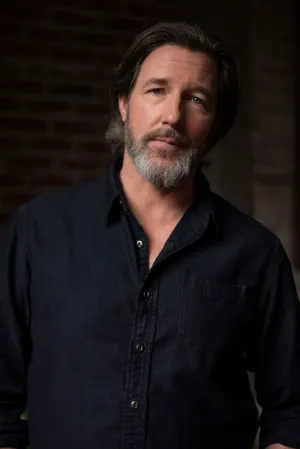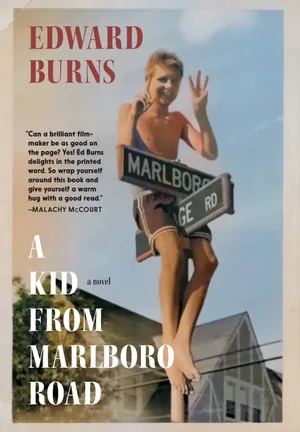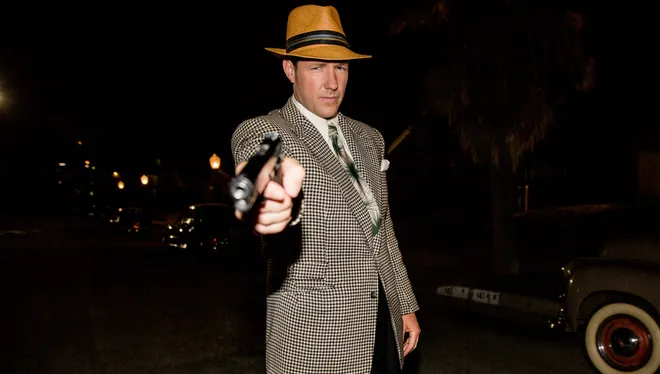Actor Ed Burns wrote a really good novel: What's based on real life and what's fiction
Ed Burns is one of those actors whose name might not immediately register. But when you see his face, clips from memorable movies and TV shows immediately surface, from "Saving Private Ryan" to "Entourage."
While the 56-year-old actor has cobbled together a three-decade career as a screenwriter, producer and director of a mostly indie projects, he now can add novelist to his resume.
"A Kid From Marlboro Road" (out Sept. 10 from Seven Stories Press, 224 pages; $27.95) is a compelling coming-of-age ode to Burns' own Irish American childhood that features enough overlaps (policeman father, Long Island setting) to feel real while allowing the author to take flights of fancy through the voice of its 12-year-old unnamed narrator.

"My dad was a cop, my mom really worked at the FAA (at JFK airport), and my dad's father really was a piece of s--- who beat the crap out of him and my grandmother," Burns tells USA TODAY while waiting in line at a Los Angeles burger joint after dropping his son (he and former model Christy Turlington have two children) off at college. "But honestly the best parts of the book is the stuff I got to make up."
Mixing the raw pathos of the Pulitzer Prize-winning memoir "Angela's Ashes," by family friend Frank McCourt, with the snarky humor of J.D. Salinger's eternal "The Catcher in the Rye," Burns conjures up a middle-class 1970s world that makes its preteen protagonist groan at almost every turn.
Check out: USA TODAY's weekly Best-selling Booklist
"That first Monday at school, some kids, mostly eighth graders, decide I must be some kind of brownnose for winning a poetry contest which means I deserved a smack to the head and a punch in the shoulder with a purple-nurple to top it off – that's when they grab your nipples and twist it," Burns writes. "(But) I got lucky. I didn't get stuck with a dopey nickname after writing my poem. Instead, I get a few dead legs, a purple-nurple, and a grandmother who's got me lined up for the priesthood."
We talked to Burns about his inspiration and creative process (edited for length and clarity).
Question: Why did you write this novel?
Answer: In film school, I fell in love with coming-of-age stories, like François Truffaut's "The 400 Blows" (1959), so I thought I could do that in a screenplay form.
During COVID, I had downtime, and I decided to tackle this as a novel after realizing doing it as a screenplay wouldn't work (given the work stoppage during the pandemic). I started by writing it in diary form through the voice of a 12-year-old. It helped that I was spending hours driving our then 14-year-old and his buddies to basketball practices, so I felt I knew how those kids spoke.

Would you want to see this turned into a movie now?
That would be my dream scenario. I'm glad it was a book first though because being an independent filmmaker I always write thinking about a budget and am mindful of what (shooting) every scene would cost. Maybe if the book does well and garners some attention, I could see it warranting a bigger budget than I'm usually dealing with.
Did you have any memoirs in mind that served as inspiration?
The template was definitely "Angela's Ashes" (1996). My dad was friends with Frank, and I knew his (older) brother Malachy, we'd worked together. I'd go into that book and reread passages and think, 'OK, yes, here's Frank at maybe around my age writing about his life as a kid, this is how he dealt with it,' and it served as a bit of a safety net.
Was "The Catcher in the Rye" an influence?
I wasn't thinking about it consciously, but back when I was a young kid and a reluctant reader of fiction, that was a book my parents gave me to give me a kick in the (rear) to fall in love with reading. It was the book for our generation really. But I also was thinking of books like (John Knowles' 1959 novel) "A Separate Peace" and (S.E. Hinton's 1967 book) "The Outsiders." They reminded me it's OK to tell a story like this from a kid's perspective.
Was it a cathartic experience to write this, given some of it is personal?
Well at first, I thought the book would just be about a kid becoming a teenager at the end of the summer, and that confusing time in any kid's life, where he's changing, his friends are changing, emotionally, physically and chemically.

But because I wrote it during COVID, I found myself calling my parents often because they were stuck down in Florida (and couldn't get back to New York). So after a bit of asking about what favorite Netflix shows they were watching, I wound up making sure I asked my mother at least one question about her life. Then, wow, suddenly we'd be on the phone for an hour, maybe remembering the day she graduated from high school and how her father then took her out to eat at a place in Manhattan.
I knew about her terrible childhood as an orphan growing up in foster care and her father being an alcoholic, but there were new memories from her as well, like riding the 3rd Avenue L (the elevated subway track) and peering into the nice apartment windows and hoping for a better life. And so all that turned the book into a kid watching his mother dealing with depression, his parents seemingly heading for divorce and his brother's life coming off the rails.
There's a lovely scene in your novel where the protagonist goes into the big city with his mother and men pay attention to her and he realizes she is pretty.
Right, so while I never took that particular trip with my own mother, I could take my life overall as a launching off point. It was a such liberating experience.
Disclaimer: The copyright of this article belongs to the original author. Reposting this article is solely for the purpose of information dissemination and does not constitute any investment advice. If there is any infringement, please contact us immediately. We will make corrections or deletions as necessary. Thank you.







